Psychological Approaches to Care - Psychology Assignment Example
VerifiedAdded on 2021/02/20
|9
|3072
|26
Essay
AI Summary
This essay delves into psychological approaches to care, examining the cases of Dave and Jenny, who are facing various personal and family challenges. The essay explores key psychological theories, including behavioral theory, Erik Erikson's psychosocial stages, the Big Five personality traits, Abraham Maslow's hierarchy of needs, and cognitive theory. It analyzes how these theories can be applied to understand the couple's struggles with stress, postpartum depression, financial difficulties, and health issues. The essay highlights the impact of these challenges on their children and the importance of communication and seeking appropriate care. Furthermore, it discusses the cognitive and emotional changes associated with middle adulthood, emphasizing the need for adaptability and emotional management. The essay provides a comprehensive overview of psychological concepts and their relevance to real-life scenarios, offering valuable insights into mental health and family dynamics.
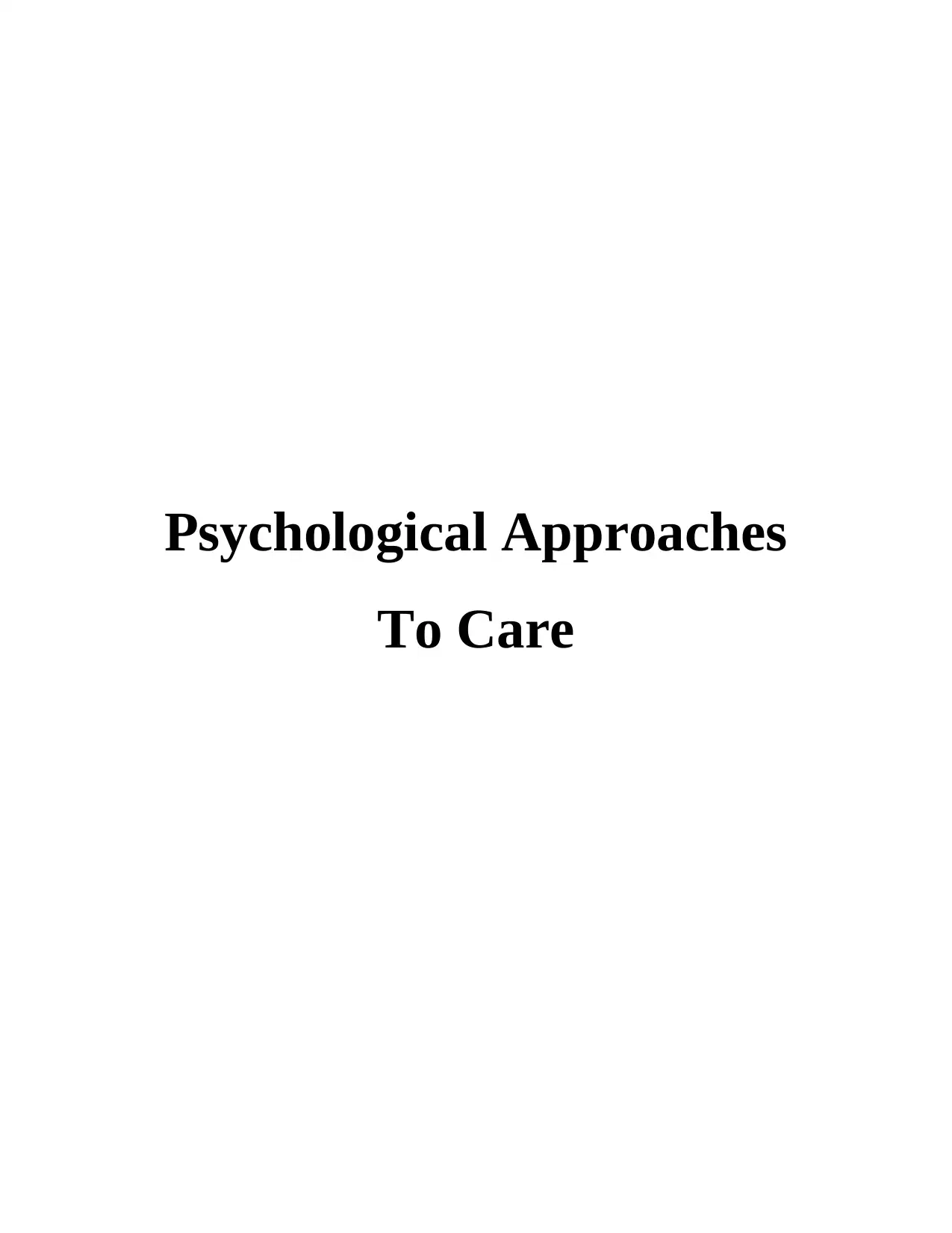
Psychological Approaches
To Care
To Care
Paraphrase This Document
Need a fresh take? Get an instant paraphrase of this document with our AI Paraphraser
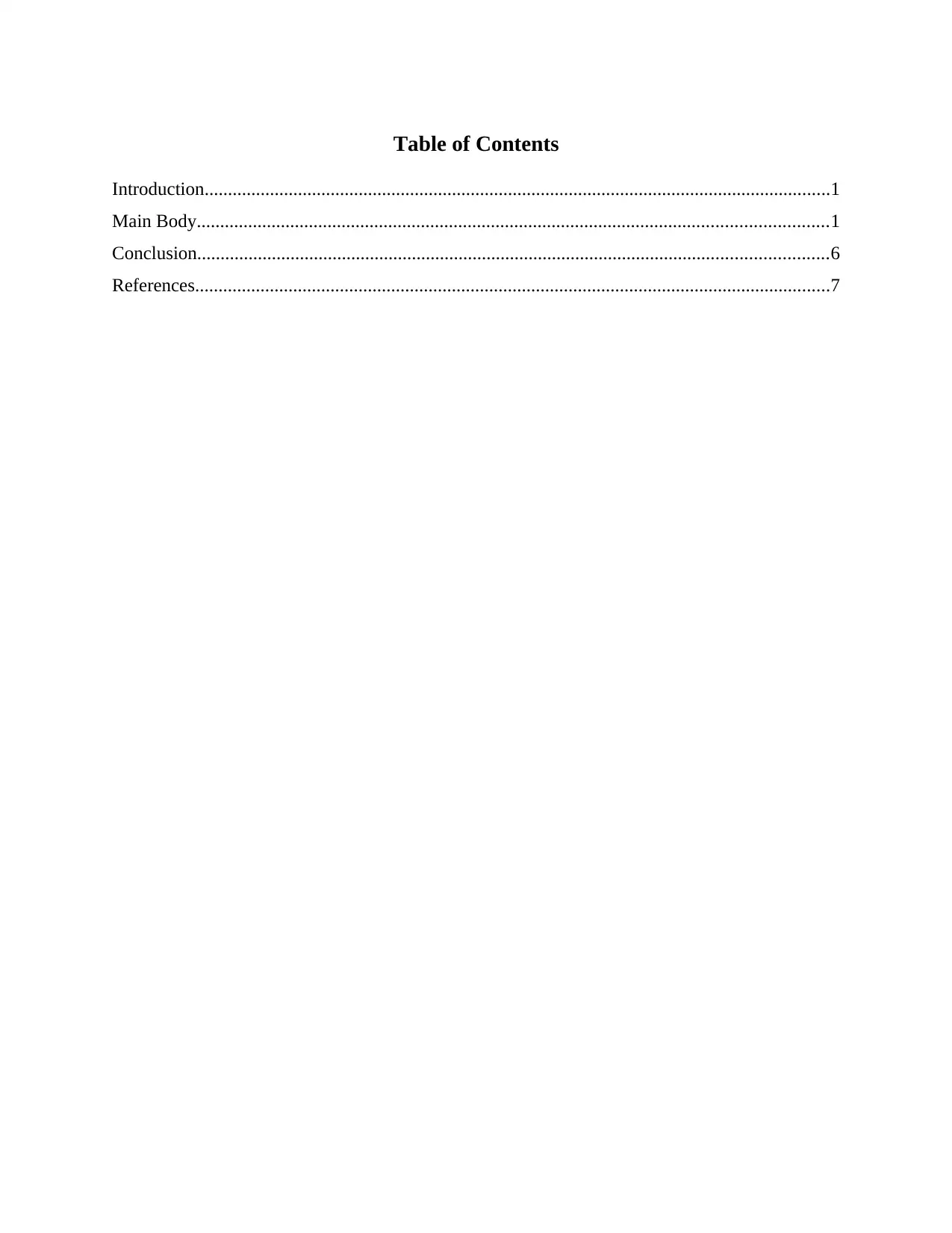
Table of Contents
Introduction......................................................................................................................................1
Main Body.......................................................................................................................................1
Conclusion.......................................................................................................................................6
References........................................................................................................................................7
Introduction......................................................................................................................................1
Main Body.......................................................................................................................................1
Conclusion.......................................................................................................................................6
References........................................................................................................................................7
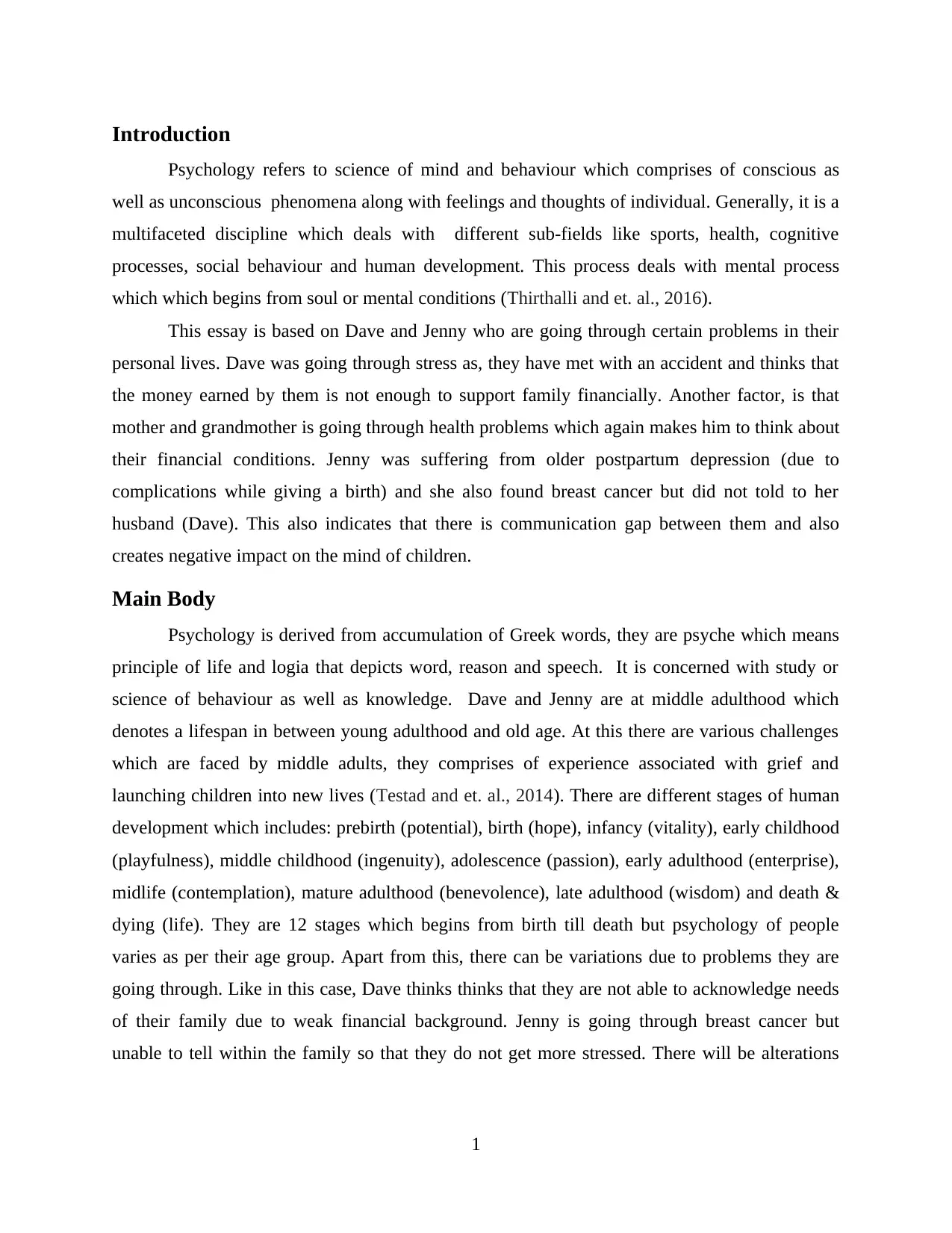
Introduction
Psychology refers to science of mind and behaviour which comprises of conscious as
well as unconscious phenomena along with feelings and thoughts of individual. Generally, it is a
multifaceted discipline which deals with different sub-fields like sports, health, cognitive
processes, social behaviour and human development. This process deals with mental process
which which begins from soul or mental conditions (Thirthalli and et. al., 2016).
This essay is based on Dave and Jenny who are going through certain problems in their
personal lives. Dave was going through stress as, they have met with an accident and thinks that
the money earned by them is not enough to support family financially. Another factor, is that
mother and grandmother is going through health problems which again makes him to think about
their financial conditions. Jenny was suffering from older postpartum depression (due to
complications while giving a birth) and she also found breast cancer but did not told to her
husband (Dave). This also indicates that there is communication gap between them and also
creates negative impact on the mind of children.
Main Body
Psychology is derived from accumulation of Greek words, they are psyche which means
principle of life and logia that depicts word, reason and speech. It is concerned with study or
science of behaviour as well as knowledge. Dave and Jenny are at middle adulthood which
denotes a lifespan in between young adulthood and old age. At this there are various challenges
which are faced by middle adults, they comprises of experience associated with grief and
launching children into new lives (Testad and et. al., 2014). There are different stages of human
development which includes: prebirth (potential), birth (hope), infancy (vitality), early childhood
(playfulness), middle childhood (ingenuity), adolescence (passion), early adulthood (enterprise),
midlife (contemplation), mature adulthood (benevolence), late adulthood (wisdom) and death &
dying (life). They are 12 stages which begins from birth till death but psychology of people
varies as per their age group. Apart from this, there can be variations due to problems they are
going through. Like in this case, Dave thinks thinks that they are not able to acknowledge needs
of their family due to weak financial background. Jenny is going through breast cancer but
unable to tell within the family so that they do not get more stressed. There will be alterations
1
Psychology refers to science of mind and behaviour which comprises of conscious as
well as unconscious phenomena along with feelings and thoughts of individual. Generally, it is a
multifaceted discipline which deals with different sub-fields like sports, health, cognitive
processes, social behaviour and human development. This process deals with mental process
which which begins from soul or mental conditions (Thirthalli and et. al., 2016).
This essay is based on Dave and Jenny who are going through certain problems in their
personal lives. Dave was going through stress as, they have met with an accident and thinks that
the money earned by them is not enough to support family financially. Another factor, is that
mother and grandmother is going through health problems which again makes him to think about
their financial conditions. Jenny was suffering from older postpartum depression (due to
complications while giving a birth) and she also found breast cancer but did not told to her
husband (Dave). This also indicates that there is communication gap between them and also
creates negative impact on the mind of children.
Main Body
Psychology is derived from accumulation of Greek words, they are psyche which means
principle of life and logia that depicts word, reason and speech. It is concerned with study or
science of behaviour as well as knowledge. Dave and Jenny are at middle adulthood which
denotes a lifespan in between young adulthood and old age. At this there are various challenges
which are faced by middle adults, they comprises of experience associated with grief and
launching children into new lives (Testad and et. al., 2014). There are different stages of human
development which includes: prebirth (potential), birth (hope), infancy (vitality), early childhood
(playfulness), middle childhood (ingenuity), adolescence (passion), early adulthood (enterprise),
midlife (contemplation), mature adulthood (benevolence), late adulthood (wisdom) and death &
dying (life). They are 12 stages which begins from birth till death but psychology of people
varies as per their age group. Apart from this, there can be variations due to problems they are
going through. Like in this case, Dave thinks thinks that they are not able to acknowledge needs
of their family due to weak financial background. Jenny is going through breast cancer but
unable to tell within the family so that they do not get more stressed. There will be alterations
1
⊘ This is a preview!⊘
Do you want full access?
Subscribe today to unlock all pages.

Trusted by 1+ million students worldwide
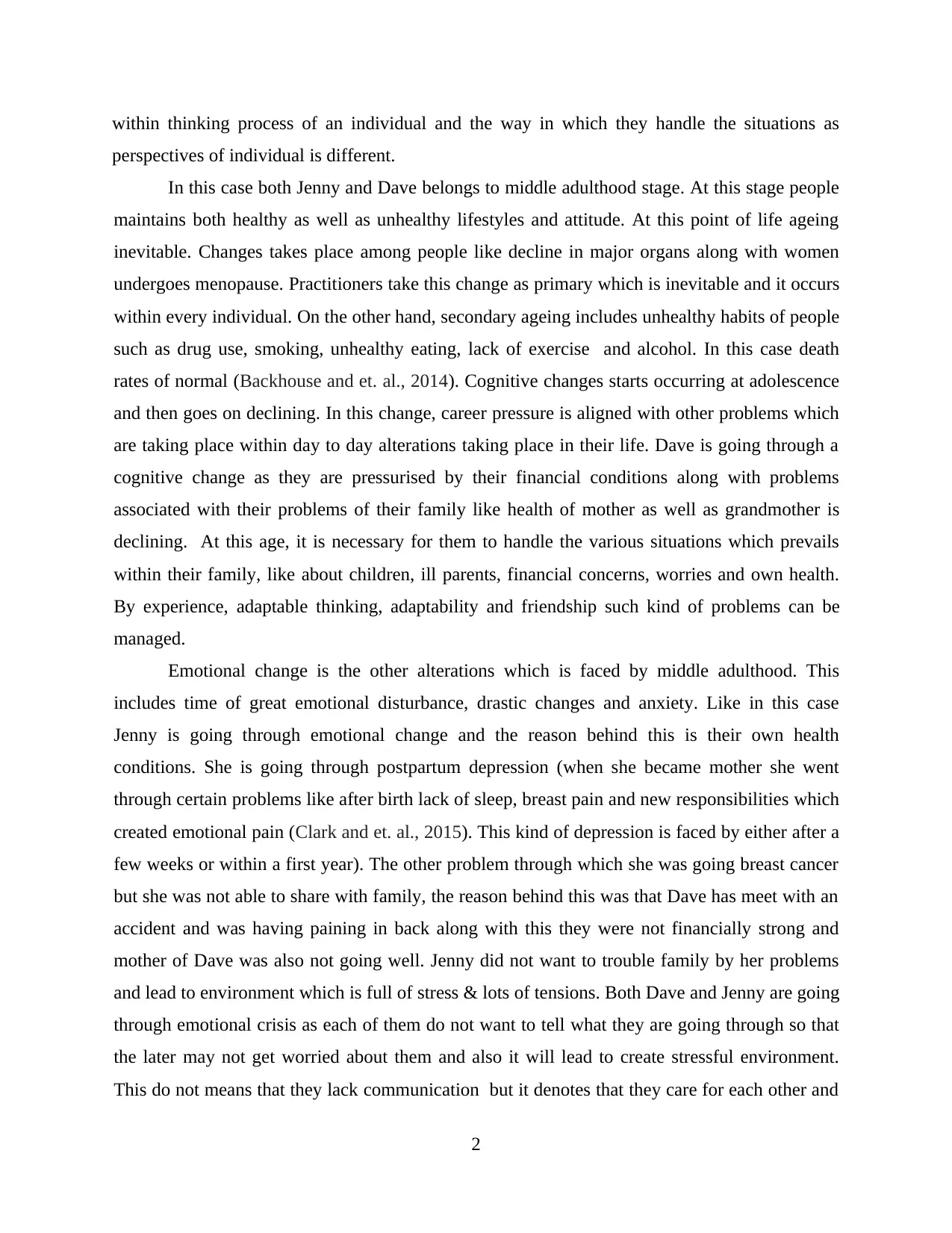
within thinking process of an individual and the way in which they handle the situations as
perspectives of individual is different.
In this case both Jenny and Dave belongs to middle adulthood stage. At this stage people
maintains both healthy as well as unhealthy lifestyles and attitude. At this point of life ageing
inevitable. Changes takes place among people like decline in major organs along with women
undergoes menopause. Practitioners take this change as primary which is inevitable and it occurs
within every individual. On the other hand, secondary ageing includes unhealthy habits of people
such as drug use, smoking, unhealthy eating, lack of exercise and alcohol. In this case death
rates of normal (Backhouse and et. al., 2014). Cognitive changes starts occurring at adolescence
and then goes on declining. In this change, career pressure is aligned with other problems which
are taking place within day to day alterations taking place in their life. Dave is going through a
cognitive change as they are pressurised by their financial conditions along with problems
associated with their problems of their family like health of mother as well as grandmother is
declining. At this age, it is necessary for them to handle the various situations which prevails
within their family, like about children, ill parents, financial concerns, worries and own health.
By experience, adaptable thinking, adaptability and friendship such kind of problems can be
managed.
Emotional change is the other alterations which is faced by middle adulthood. This
includes time of great emotional disturbance, drastic changes and anxiety. Like in this case
Jenny is going through emotional change and the reason behind this is their own health
conditions. She is going through postpartum depression (when she became mother she went
through certain problems like after birth lack of sleep, breast pain and new responsibilities which
created emotional pain (Clark and et. al., 2015). This kind of depression is faced by either after a
few weeks or within a first year). The other problem through which she was going breast cancer
but she was not able to share with family, the reason behind this was that Dave has meet with an
accident and was having paining in back along with this they were not financially strong and
mother of Dave was also not going well. Jenny did not want to trouble family by her problems
and lead to environment which is full of stress & lots of tensions. Both Dave and Jenny are going
through emotional crisis as each of them do not want to tell what they are going through so that
the later may not get worried about them and also it will lead to create stressful environment.
This do not means that they lack communication but it denotes that they care for each other and
2
perspectives of individual is different.
In this case both Jenny and Dave belongs to middle adulthood stage. At this stage people
maintains both healthy as well as unhealthy lifestyles and attitude. At this point of life ageing
inevitable. Changes takes place among people like decline in major organs along with women
undergoes menopause. Practitioners take this change as primary which is inevitable and it occurs
within every individual. On the other hand, secondary ageing includes unhealthy habits of people
such as drug use, smoking, unhealthy eating, lack of exercise and alcohol. In this case death
rates of normal (Backhouse and et. al., 2014). Cognitive changes starts occurring at adolescence
and then goes on declining. In this change, career pressure is aligned with other problems which
are taking place within day to day alterations taking place in their life. Dave is going through a
cognitive change as they are pressurised by their financial conditions along with problems
associated with their problems of their family like health of mother as well as grandmother is
declining. At this age, it is necessary for them to handle the various situations which prevails
within their family, like about children, ill parents, financial concerns, worries and own health.
By experience, adaptable thinking, adaptability and friendship such kind of problems can be
managed.
Emotional change is the other alterations which is faced by middle adulthood. This
includes time of great emotional disturbance, drastic changes and anxiety. Like in this case
Jenny is going through emotional change and the reason behind this is their own health
conditions. She is going through postpartum depression (when she became mother she went
through certain problems like after birth lack of sleep, breast pain and new responsibilities which
created emotional pain (Clark and et. al., 2015). This kind of depression is faced by either after a
few weeks or within a first year). The other problem through which she was going breast cancer
but she was not able to share with family, the reason behind this was that Dave has meet with an
accident and was having paining in back along with this they were not financially strong and
mother of Dave was also not going well. Jenny did not want to trouble family by her problems
and lead to environment which is full of stress & lots of tensions. Both Dave and Jenny are going
through emotional crisis as each of them do not want to tell what they are going through so that
the later may not get worried about them and also it will lead to create stressful environment.
This do not means that they lack communication but it denotes that they care for each other and
2
Paraphrase This Document
Need a fresh take? Get an instant paraphrase of this document with our AI Paraphraser
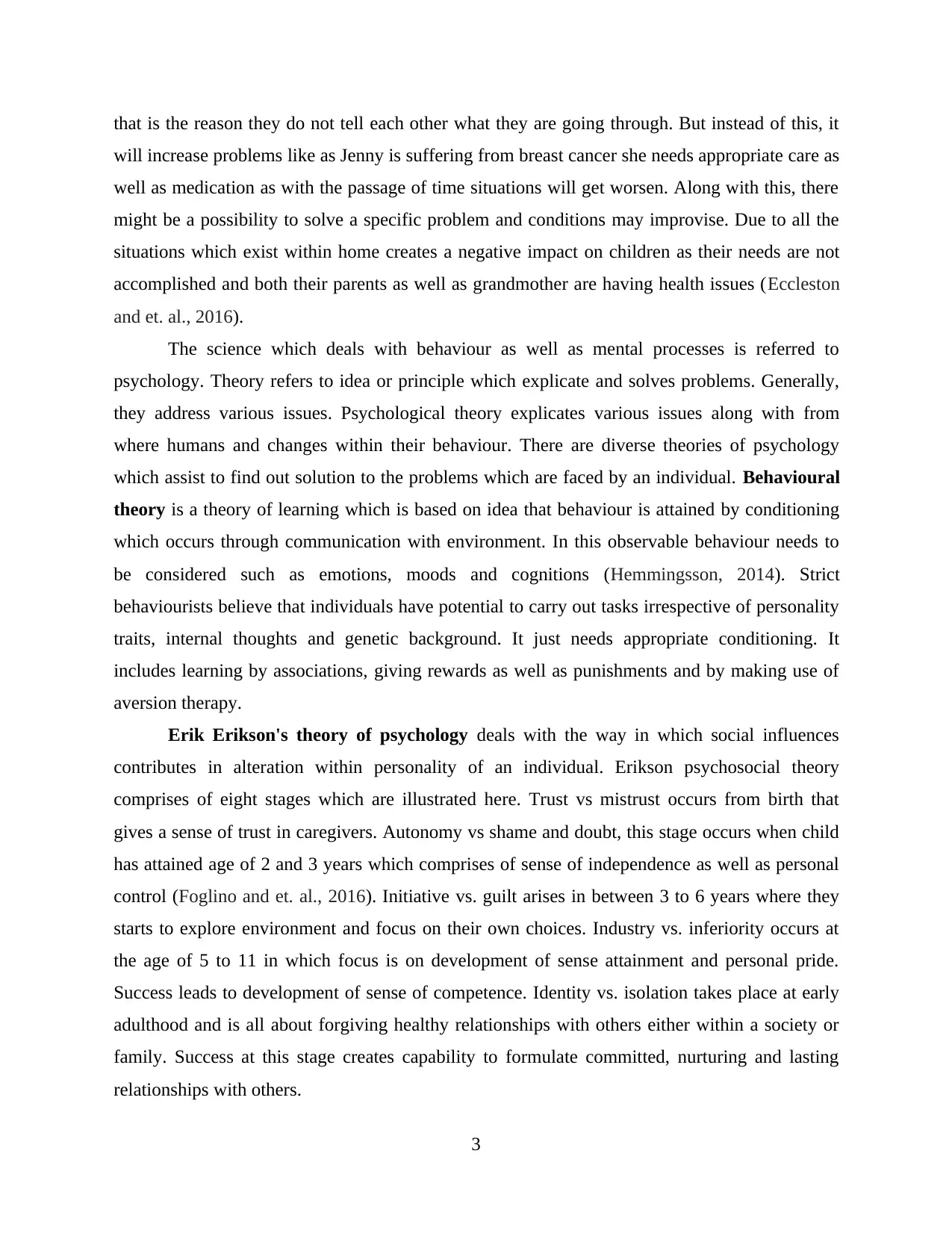
that is the reason they do not tell each other what they are going through. But instead of this, it
will increase problems like as Jenny is suffering from breast cancer she needs appropriate care as
well as medication as with the passage of time situations will get worsen. Along with this, there
might be a possibility to solve a specific problem and conditions may improvise. Due to all the
situations which exist within home creates a negative impact on children as their needs are not
accomplished and both their parents as well as grandmother are having health issues (Eccleston
and et. al., 2016).
The science which deals with behaviour as well as mental processes is referred to
psychology. Theory refers to idea or principle which explicate and solves problems. Generally,
they address various issues. Psychological theory explicates various issues along with from
where humans and changes within their behaviour. There are diverse theories of psychology
which assist to find out solution to the problems which are faced by an individual. Behavioural
theory is a theory of learning which is based on idea that behaviour is attained by conditioning
which occurs through communication with environment. In this observable behaviour needs to
be considered such as emotions, moods and cognitions (Hemmingsson, 2014). Strict
behaviourists believe that individuals have potential to carry out tasks irrespective of personality
traits, internal thoughts and genetic background. It just needs appropriate conditioning. It
includes learning by associations, giving rewards as well as punishments and by making use of
aversion therapy.
Erik Erikson's theory of psychology deals with the way in which social influences
contributes in alteration within personality of an individual. Erikson psychosocial theory
comprises of eight stages which are illustrated here. Trust vs mistrust occurs from birth that
gives a sense of trust in caregivers. Autonomy vs shame and doubt, this stage occurs when child
has attained age of 2 and 3 years which comprises of sense of independence as well as personal
control (Foglino and et. al., 2016). Initiative vs. guilt arises in between 3 to 6 years where they
starts to explore environment and focus on their own choices. Industry vs. inferiority occurs at
the age of 5 to 11 in which focus is on development of sense attainment and personal pride.
Success leads to development of sense of competence. Identity vs. isolation takes place at early
adulthood and is all about forgiving healthy relationships with others either within a society or
family. Success at this stage creates capability to formulate committed, nurturing and lasting
relationships with others.
3
will increase problems like as Jenny is suffering from breast cancer she needs appropriate care as
well as medication as with the passage of time situations will get worsen. Along with this, there
might be a possibility to solve a specific problem and conditions may improvise. Due to all the
situations which exist within home creates a negative impact on children as their needs are not
accomplished and both their parents as well as grandmother are having health issues (Eccleston
and et. al., 2016).
The science which deals with behaviour as well as mental processes is referred to
psychology. Theory refers to idea or principle which explicate and solves problems. Generally,
they address various issues. Psychological theory explicates various issues along with from
where humans and changes within their behaviour. There are diverse theories of psychology
which assist to find out solution to the problems which are faced by an individual. Behavioural
theory is a theory of learning which is based on idea that behaviour is attained by conditioning
which occurs through communication with environment. In this observable behaviour needs to
be considered such as emotions, moods and cognitions (Hemmingsson, 2014). Strict
behaviourists believe that individuals have potential to carry out tasks irrespective of personality
traits, internal thoughts and genetic background. It just needs appropriate conditioning. It
includes learning by associations, giving rewards as well as punishments and by making use of
aversion therapy.
Erik Erikson's theory of psychology deals with the way in which social influences
contributes in alteration within personality of an individual. Erikson psychosocial theory
comprises of eight stages which are illustrated here. Trust vs mistrust occurs from birth that
gives a sense of trust in caregivers. Autonomy vs shame and doubt, this stage occurs when child
has attained age of 2 and 3 years which comprises of sense of independence as well as personal
control (Foglino and et. al., 2016). Initiative vs. guilt arises in between 3 to 6 years where they
starts to explore environment and focus on their own choices. Industry vs. inferiority occurs at
the age of 5 to 11 in which focus is on development of sense attainment and personal pride.
Success leads to development of sense of competence. Identity vs. isolation takes place at early
adulthood and is all about forgiving healthy relationships with others either within a society or
family. Success at this stage creates capability to formulate committed, nurturing and lasting
relationships with others.
3
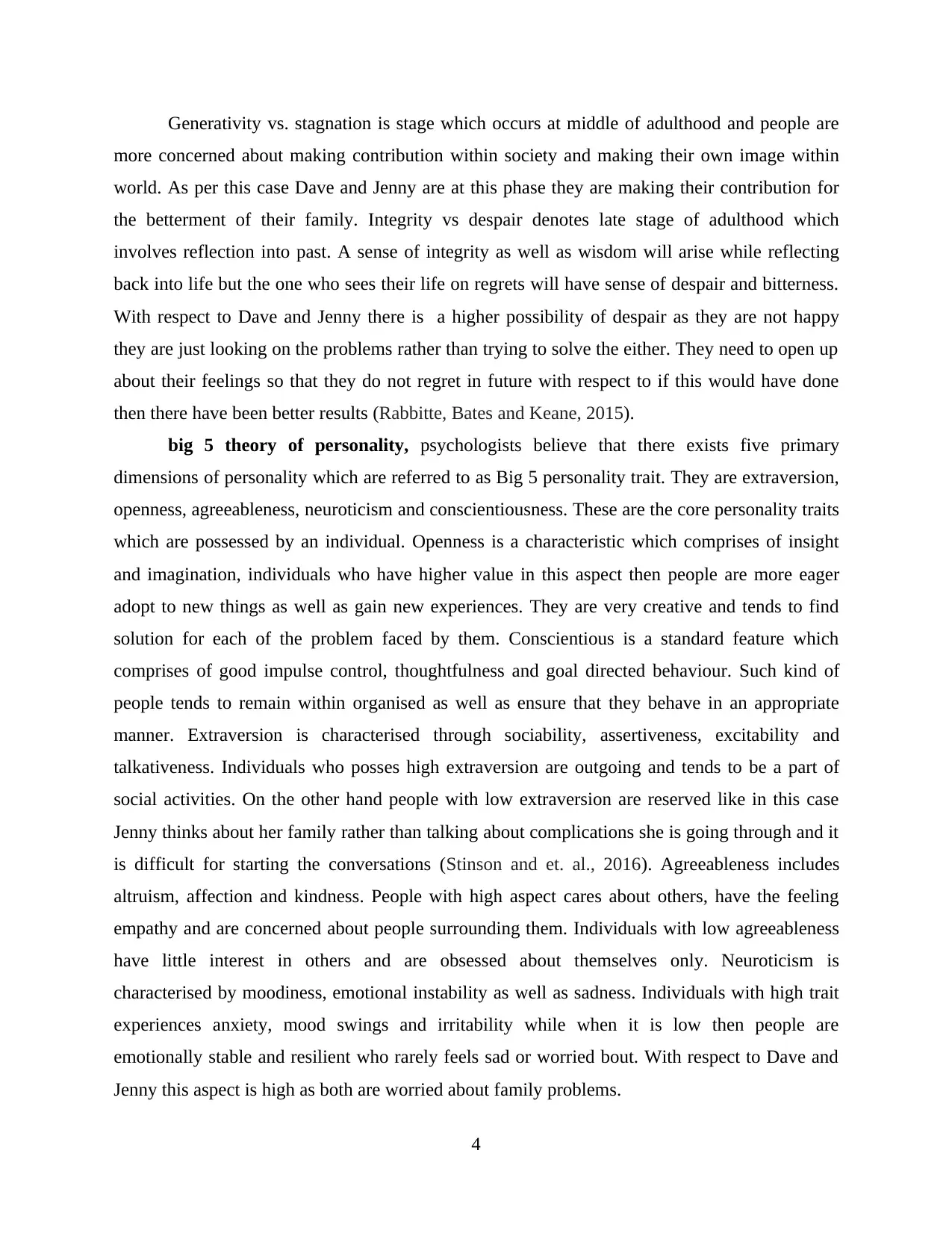
Generativity vs. stagnation is stage which occurs at middle of adulthood and people are
more concerned about making contribution within society and making their own image within
world. As per this case Dave and Jenny are at this phase they are making their contribution for
the betterment of their family. Integrity vs despair denotes late stage of adulthood which
involves reflection into past. A sense of integrity as well as wisdom will arise while reflecting
back into life but the one who sees their life on regrets will have sense of despair and bitterness.
With respect to Dave and Jenny there is a higher possibility of despair as they are not happy
they are just looking on the problems rather than trying to solve the either. They need to open up
about their feelings so that they do not regret in future with respect to if this would have done
then there have been better results (Rabbitte, Bates and Keane, 2015).
big 5 theory of personality, psychologists believe that there exists five primary
dimensions of personality which are referred to as Big 5 personality trait. They are extraversion,
openness, agreeableness, neuroticism and conscientiousness. These are the core personality traits
which are possessed by an individual. Openness is a characteristic which comprises of insight
and imagination, individuals who have higher value in this aspect then people are more eager
adopt to new things as well as gain new experiences. They are very creative and tends to find
solution for each of the problem faced by them. Conscientious is a standard feature which
comprises of good impulse control, thoughtfulness and goal directed behaviour. Such kind of
people tends to remain within organised as well as ensure that they behave in an appropriate
manner. Extraversion is characterised through sociability, assertiveness, excitability and
talkativeness. Individuals who posses high extraversion are outgoing and tends to be a part of
social activities. On the other hand people with low extraversion are reserved like in this case
Jenny thinks about her family rather than talking about complications she is going through and it
is difficult for starting the conversations (Stinson and et. al., 2016). Agreeableness includes
altruism, affection and kindness. People with high aspect cares about others, have the feeling
empathy and are concerned about people surrounding them. Individuals with low agreeableness
have little interest in others and are obsessed about themselves only. Neuroticism is
characterised by moodiness, emotional instability as well as sadness. Individuals with high trait
experiences anxiety, mood swings and irritability while when it is low then people are
emotionally stable and resilient who rarely feels sad or worried bout. With respect to Dave and
Jenny this aspect is high as both are worried about family problems.
4
more concerned about making contribution within society and making their own image within
world. As per this case Dave and Jenny are at this phase they are making their contribution for
the betterment of their family. Integrity vs despair denotes late stage of adulthood which
involves reflection into past. A sense of integrity as well as wisdom will arise while reflecting
back into life but the one who sees their life on regrets will have sense of despair and bitterness.
With respect to Dave and Jenny there is a higher possibility of despair as they are not happy
they are just looking on the problems rather than trying to solve the either. They need to open up
about their feelings so that they do not regret in future with respect to if this would have done
then there have been better results (Rabbitte, Bates and Keane, 2015).
big 5 theory of personality, psychologists believe that there exists five primary
dimensions of personality which are referred to as Big 5 personality trait. They are extraversion,
openness, agreeableness, neuroticism and conscientiousness. These are the core personality traits
which are possessed by an individual. Openness is a characteristic which comprises of insight
and imagination, individuals who have higher value in this aspect then people are more eager
adopt to new things as well as gain new experiences. They are very creative and tends to find
solution for each of the problem faced by them. Conscientious is a standard feature which
comprises of good impulse control, thoughtfulness and goal directed behaviour. Such kind of
people tends to remain within organised as well as ensure that they behave in an appropriate
manner. Extraversion is characterised through sociability, assertiveness, excitability and
talkativeness. Individuals who posses high extraversion are outgoing and tends to be a part of
social activities. On the other hand people with low extraversion are reserved like in this case
Jenny thinks about her family rather than talking about complications she is going through and it
is difficult for starting the conversations (Stinson and et. al., 2016). Agreeableness includes
altruism, affection and kindness. People with high aspect cares about others, have the feeling
empathy and are concerned about people surrounding them. Individuals with low agreeableness
have little interest in others and are obsessed about themselves only. Neuroticism is
characterised by moodiness, emotional instability as well as sadness. Individuals with high trait
experiences anxiety, mood swings and irritability while when it is low then people are
emotionally stable and resilient who rarely feels sad or worried bout. With respect to Dave and
Jenny this aspect is high as both are worried about family problems.
4
⊘ This is a preview!⊘
Do you want full access?
Subscribe today to unlock all pages.

Trusted by 1+ million students worldwide
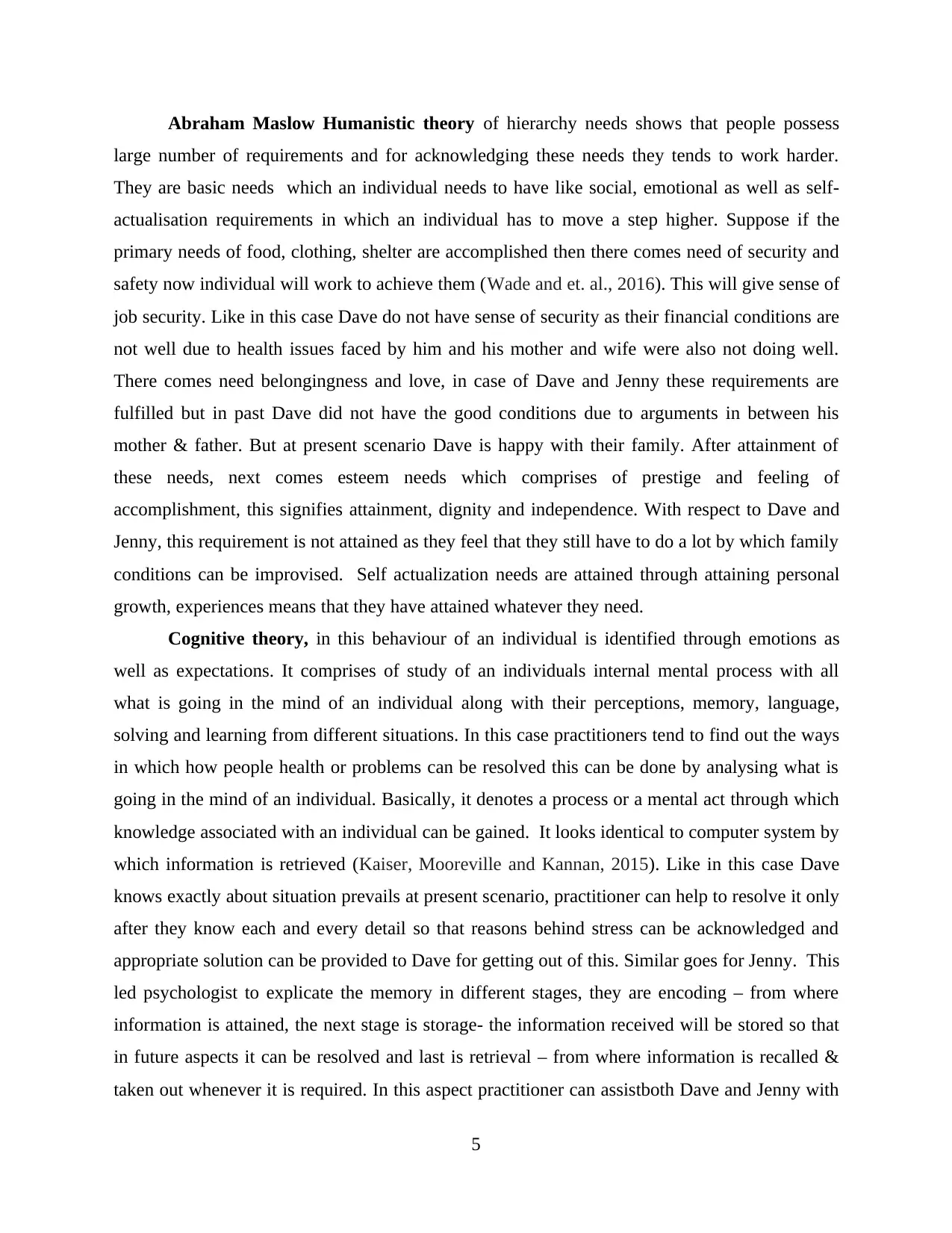
Abraham Maslow Humanistic theory of hierarchy needs shows that people possess
large number of requirements and for acknowledging these needs they tends to work harder.
They are basic needs which an individual needs to have like social, emotional as well as self-
actualisation requirements in which an individual has to move a step higher. Suppose if the
primary needs of food, clothing, shelter are accomplished then there comes need of security and
safety now individual will work to achieve them (Wade and et. al., 2016). This will give sense of
job security. Like in this case Dave do not have sense of security as their financial conditions are
not well due to health issues faced by him and his mother and wife were also not doing well.
There comes need belongingness and love, in case of Dave and Jenny these requirements are
fulfilled but in past Dave did not have the good conditions due to arguments in between his
mother & father. But at present scenario Dave is happy with their family. After attainment of
these needs, next comes esteem needs which comprises of prestige and feeling of
accomplishment, this signifies attainment, dignity and independence. With respect to Dave and
Jenny, this requirement is not attained as they feel that they still have to do a lot by which family
conditions can be improvised. Self actualization needs are attained through attaining personal
growth, experiences means that they have attained whatever they need.
Cognitive theory, in this behaviour of an individual is identified through emotions as
well as expectations. It comprises of study of an individuals internal mental process with all
what is going in the mind of an individual along with their perceptions, memory, language,
solving and learning from different situations. In this case practitioners tend to find out the ways
in which how people health or problems can be resolved this can be done by analysing what is
going in the mind of an individual. Basically, it denotes a process or a mental act through which
knowledge associated with an individual can be gained. It looks identical to computer system by
which information is retrieved (Kaiser, Mooreville and Kannan, 2015). Like in this case Dave
knows exactly about situation prevails at present scenario, practitioner can help to resolve it only
after they know each and every detail so that reasons behind stress can be acknowledged and
appropriate solution can be provided to Dave for getting out of this. Similar goes for Jenny. This
led psychologist to explicate the memory in different stages, they are encoding – from where
information is attained, the next stage is storage- the information received will be stored so that
in future aspects it can be resolved and last is retrieval – from where information is recalled &
taken out whenever it is required. In this aspect practitioner can assistboth Dave and Jenny with
5
large number of requirements and for acknowledging these needs they tends to work harder.
They are basic needs which an individual needs to have like social, emotional as well as self-
actualisation requirements in which an individual has to move a step higher. Suppose if the
primary needs of food, clothing, shelter are accomplished then there comes need of security and
safety now individual will work to achieve them (Wade and et. al., 2016). This will give sense of
job security. Like in this case Dave do not have sense of security as their financial conditions are
not well due to health issues faced by him and his mother and wife were also not doing well.
There comes need belongingness and love, in case of Dave and Jenny these requirements are
fulfilled but in past Dave did not have the good conditions due to arguments in between his
mother & father. But at present scenario Dave is happy with their family. After attainment of
these needs, next comes esteem needs which comprises of prestige and feeling of
accomplishment, this signifies attainment, dignity and independence. With respect to Dave and
Jenny, this requirement is not attained as they feel that they still have to do a lot by which family
conditions can be improvised. Self actualization needs are attained through attaining personal
growth, experiences means that they have attained whatever they need.
Cognitive theory, in this behaviour of an individual is identified through emotions as
well as expectations. It comprises of study of an individuals internal mental process with all
what is going in the mind of an individual along with their perceptions, memory, language,
solving and learning from different situations. In this case practitioners tend to find out the ways
in which how people health or problems can be resolved this can be done by analysing what is
going in the mind of an individual. Basically, it denotes a process or a mental act through which
knowledge associated with an individual can be gained. It looks identical to computer system by
which information is retrieved (Kaiser, Mooreville and Kannan, 2015). Like in this case Dave
knows exactly about situation prevails at present scenario, practitioner can help to resolve it only
after they know each and every detail so that reasons behind stress can be acknowledged and
appropriate solution can be provided to Dave for getting out of this. Similar goes for Jenny. This
led psychologist to explicate the memory in different stages, they are encoding – from where
information is attained, the next stage is storage- the information received will be stored so that
in future aspects it can be resolved and last is retrieval – from where information is recalled &
taken out whenever it is required. In this aspect practitioner can assistboth Dave and Jenny with
5
Paraphrase This Document
Need a fresh take? Get an instant paraphrase of this document with our AI Paraphraser
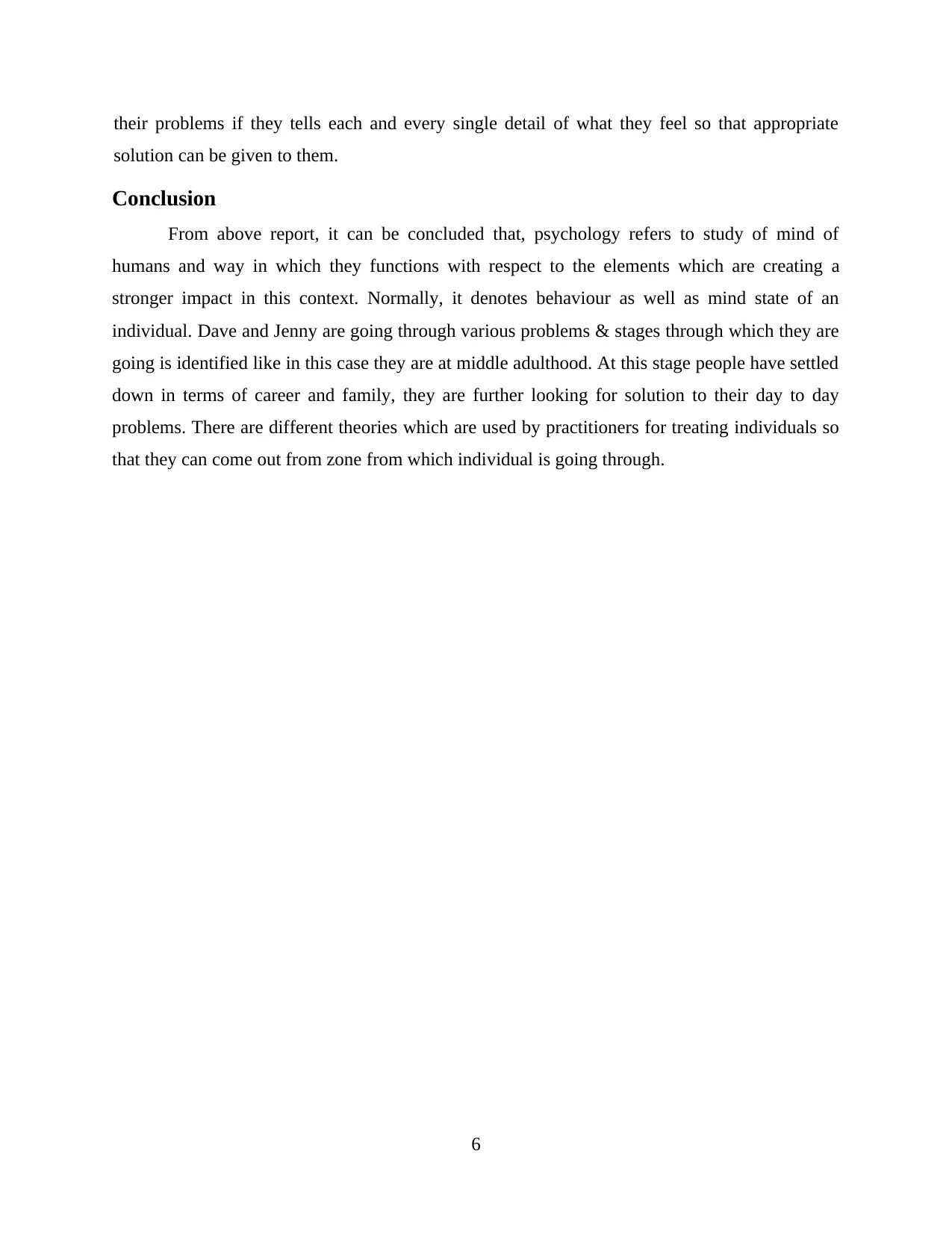
their problems if they tells each and every single detail of what they feel so that appropriate
solution can be given to them.
Conclusion
From above report, it can be concluded that, psychology refers to study of mind of
humans and way in which they functions with respect to the elements which are creating a
stronger impact in this context. Normally, it denotes behaviour as well as mind state of an
individual. Dave and Jenny are going through various problems & stages through which they are
going is identified like in this case they are at middle adulthood. At this stage people have settled
down in terms of career and family, they are further looking for solution to their day to day
problems. There are different theories which are used by practitioners for treating individuals so
that they can come out from zone from which individual is going through.
6
solution can be given to them.
Conclusion
From above report, it can be concluded that, psychology refers to study of mind of
humans and way in which they functions with respect to the elements which are creating a
stronger impact in this context. Normally, it denotes behaviour as well as mind state of an
individual. Dave and Jenny are going through various problems & stages through which they are
going is identified like in this case they are at middle adulthood. At this stage people have settled
down in terms of career and family, they are further looking for solution to their day to day
problems. There are different theories which are used by practitioners for treating individuals so
that they can come out from zone from which individual is going through.
6
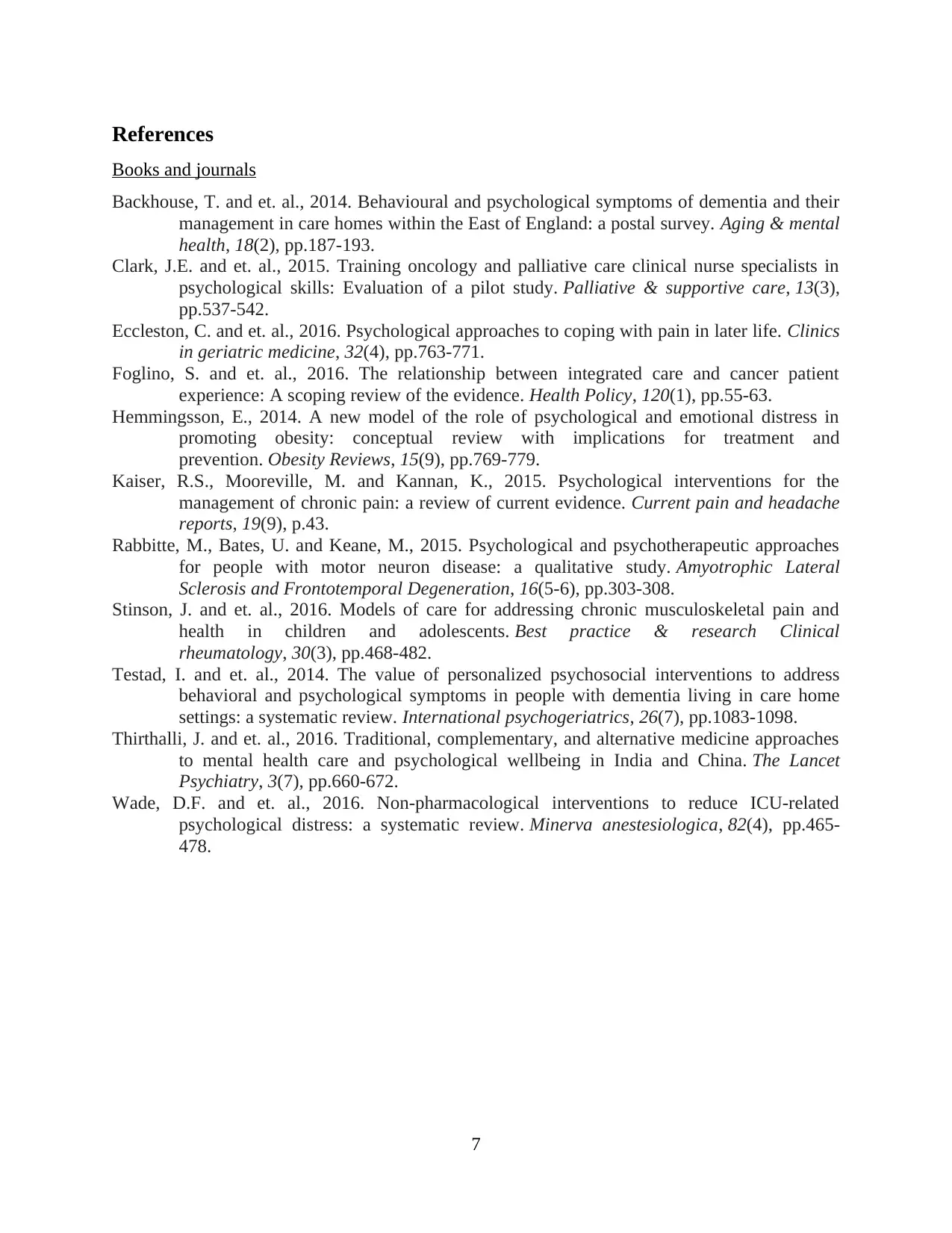
References
Books and journals
Backhouse, T. and et. al., 2014. Behavioural and psychological symptoms of dementia and their
management in care homes within the East of England: a postal survey. Aging & mental
health, 18(2), pp.187-193.
Clark, J.E. and et. al., 2015. Training oncology and palliative care clinical nurse specialists in
psychological skills: Evaluation of a pilot study. Palliative & supportive care, 13(3),
pp.537-542.
Eccleston, C. and et. al., 2016. Psychological approaches to coping with pain in later life. Clinics
in geriatric medicine, 32(4), pp.763-771.
Foglino, S. and et. al., 2016. The relationship between integrated care and cancer patient
experience: A scoping review of the evidence. Health Policy, 120(1), pp.55-63.
Hemmingsson, E., 2014. A new model of the role of psychological and emotional distress in
promoting obesity: conceptual review with implications for treatment and
prevention. Obesity Reviews, 15(9), pp.769-779.
Kaiser, R.S., Mooreville, M. and Kannan, K., 2015. Psychological interventions for the
management of chronic pain: a review of current evidence. Current pain and headache
reports, 19(9), p.43.
Rabbitte, M., Bates, U. and Keane, M., 2015. Psychological and psychotherapeutic approaches
for people with motor neuron disease: a qualitative study. Amyotrophic Lateral
Sclerosis and Frontotemporal Degeneration, 16(5-6), pp.303-308.
Stinson, J. and et. al., 2016. Models of care for addressing chronic musculoskeletal pain and
health in children and adolescents. Best practice & research Clinical
rheumatology, 30(3), pp.468-482.
Testad, I. and et. al., 2014. The value of personalized psychosocial interventions to address
behavioral and psychological symptoms in people with dementia living in care home
settings: a systematic review. International psychogeriatrics, 26(7), pp.1083-1098.
Thirthalli, J. and et. al., 2016. Traditional, complementary, and alternative medicine approaches
to mental health care and psychological wellbeing in India and China. The Lancet
Psychiatry, 3(7), pp.660-672.
Wade, D.F. and et. al., 2016. Non-pharmacological interventions to reduce ICU-related
psychological distress: a systematic review. Minerva anestesiologica, 82(4), pp.465-
478.
7
Books and journals
Backhouse, T. and et. al., 2014. Behavioural and psychological symptoms of dementia and their
management in care homes within the East of England: a postal survey. Aging & mental
health, 18(2), pp.187-193.
Clark, J.E. and et. al., 2015. Training oncology and palliative care clinical nurse specialists in
psychological skills: Evaluation of a pilot study. Palliative & supportive care, 13(3),
pp.537-542.
Eccleston, C. and et. al., 2016. Psychological approaches to coping with pain in later life. Clinics
in geriatric medicine, 32(4), pp.763-771.
Foglino, S. and et. al., 2016. The relationship between integrated care and cancer patient
experience: A scoping review of the evidence. Health Policy, 120(1), pp.55-63.
Hemmingsson, E., 2014. A new model of the role of psychological and emotional distress in
promoting obesity: conceptual review with implications for treatment and
prevention. Obesity Reviews, 15(9), pp.769-779.
Kaiser, R.S., Mooreville, M. and Kannan, K., 2015. Psychological interventions for the
management of chronic pain: a review of current evidence. Current pain and headache
reports, 19(9), p.43.
Rabbitte, M., Bates, U. and Keane, M., 2015. Psychological and psychotherapeutic approaches
for people with motor neuron disease: a qualitative study. Amyotrophic Lateral
Sclerosis and Frontotemporal Degeneration, 16(5-6), pp.303-308.
Stinson, J. and et. al., 2016. Models of care for addressing chronic musculoskeletal pain and
health in children and adolescents. Best practice & research Clinical
rheumatology, 30(3), pp.468-482.
Testad, I. and et. al., 2014. The value of personalized psychosocial interventions to address
behavioral and psychological symptoms in people with dementia living in care home
settings: a systematic review. International psychogeriatrics, 26(7), pp.1083-1098.
Thirthalli, J. and et. al., 2016. Traditional, complementary, and alternative medicine approaches
to mental health care and psychological wellbeing in India and China. The Lancet
Psychiatry, 3(7), pp.660-672.
Wade, D.F. and et. al., 2016. Non-pharmacological interventions to reduce ICU-related
psychological distress: a systematic review. Minerva anestesiologica, 82(4), pp.465-
478.
7
⊘ This is a preview!⊘
Do you want full access?
Subscribe today to unlock all pages.

Trusted by 1+ million students worldwide
1 out of 9
Related Documents
Your All-in-One AI-Powered Toolkit for Academic Success.
+13062052269
info@desklib.com
Available 24*7 on WhatsApp / Email
![[object Object]](/_next/static/media/star-bottom.7253800d.svg)
Unlock your academic potential
Copyright © 2020–2026 A2Z Services. All Rights Reserved. Developed and managed by ZUCOL.



